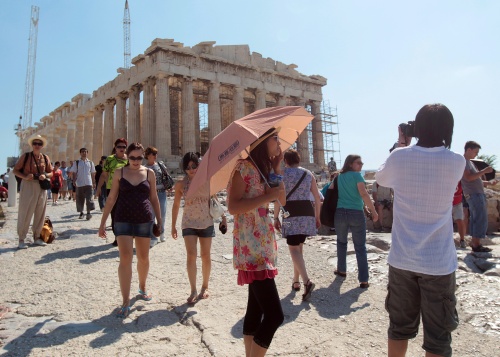By Peggy Goldman, Travel expert, President of Friendly Planet Travel-Huffington Post
It's hard to describe the heartache I felt a scant four years ago when visiting Athens' Plaka, the charming, ancient neighborhood that abuts the Parthenon and Acropolis. The cobble-stoned district, known for its lively street life, stood almost desolate compared to better times.
Gone were all but a few of the artists and merchants, the mix of tourists and Greeks packed into tavernas and the lovers stealing late night kisses against ancient stone walls. They had left, along with the millions of tourists a year who had regularly made the pilgrimage to the very crucible of Western civilization. They had been scared off by unrest and uncertainty, and the gathering cloud of doubt as to whether Greece would somehow derail economically and go the way of Egypt, another tourism mecca turned sour by revolution.
Yet centuries of civilization are hard to wash away. And although Greece continues to claw its way back economically, the tourists have returned. Along with them has come a renewed sense of discovery and appreciation for the beauty, glory and power of Greece, from its mainland to some 6,000 islands that dot the Mediterranean and Aegean Seas.
In fact, last year, a record 17.9 million tourists traveled to Greece, many no doubt attracted by strong deals on everything from hotels to restaurants to rental cars. And if you are concerned about living off the Greek people's own suffering, remember this: Tourism accounted for 16.4 percent of Greek gross domestic product in 2012. The Greek people are happy to share the wonders of a land so magnificent that the gods themselves once chose to play here, Poseidon in its waters and Zeus upon its mountains.
For those of you who have never been, the places to visit are obvious: Athens for nightlife, shopping and ruins; Mykonos for romance; and Santorini for breathtaking views. But Greece offers so much more. Beyond the city center and away from the beach resorts, visitors can feel a renewed sense of optimism that fills the spring air and makes it impossible to stay away.
Here are just a few of my favorite off-the-beaten-path destinations that make Greece a place to once again add to your bucket list of life's great vacations:
A Heraklion effort
No other part of Greece provides as authentic an experience as Crete, Greece's largest island and Europe's southernmost destination. Separated from Athens by some 196 miles of open sea, Cretans live as one with nature — eating all things bio (Greek for organic) and farmed among its mountains and valleys. This is the home of the original Mediterranean diet, rich in olive oil and fresh fish.
But Crete's greatest treasure is Knossos, an ancient Minoan Palace, located in the Cretan city of Heraklion, an industrial seaport. Knossos served as the political and economic center of the Minoan people, who dated back to the 27th century B.C., and, as legend has it, was home of the mythical Minotaur kept by King Minos. Discovered in the early 1990s by British archaeologist Sir Arthur Evans, Knossos is one of the world's great antiquities, on par with Greece's Parthenon or Acropolis, but far less visited and well worth a day's discovery.
The eye of Delphi
The ancient site of Delphi sits high on the hillside of Mt. Parnassus, the legendary home to the all-seeing Oracle of Delphi, the human messenger of Apollo. Today, Delphi hosts the remains of the monuments and temples constructed to continue the gods' work on Earth. Visit the Pan-Hellenic sanctuary and sit in the stands of the stadium that hosted the Pythian Games, a sort of Woodstock meets Super Bowl that mixed athletics, dance, music and theater.
Mycenae is all Greek to you and me
In a country with so many ruins and reminders of the ancient past, it's only fair to pay homage to the original culture that inhabited the Grecian mainland — the Mycenaeans. These ancient people dominated the eastern Mediterranean throughout the 15th century B.C., and left behind a scattering of remains that give glimpses into an organized and advanced culture. The ruins of the city of Mycenae, a UNESCO World Heritage Site, are perched high on a hill overlooking the rolling Greek countryside. To breach the once impassable fortress, visitors first pass through the legendary and massive Lion Gate to explore beehive-structured catacombs that once held the remains of Mycenaean royalty.
So Greece is back on international travelers' list of must-see places. The economic shocks of the past four years, while still echoing through Greek society, have subsided, and the Greek government and people are eager to welcome back the world. The great Greek revival is testament to a culture and country that has withstood myths and legends, ages and antiquities and anything a banking crisis can throw at it.



















